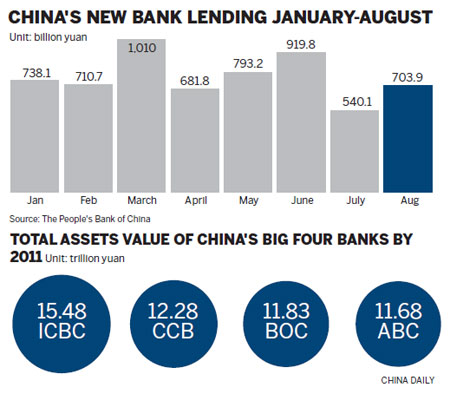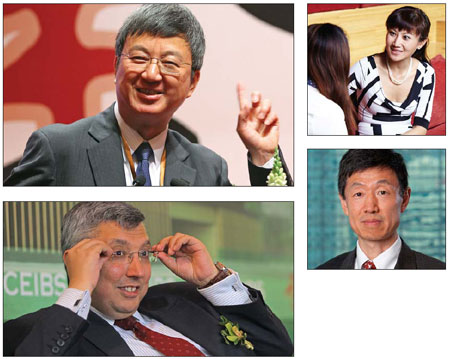Risk averse
Updated: 2012-10-05 08:33
By Andrew Moody and Hu Haiyan (China Daily)
|
||||||||
|
Clockwise from top left: Zhu Min, deputy managing director of the IMF; Junheng Li, founder and senior equity analyst of JL Warren Capital; Weijian Shan, chairman and CEO of PAG; Sushil Saluja, managing director of financial services, Asia Pacific for Accenture. Zou Hong / China Daily Provided to China Daily |
While small businesses in the West also find difficulty in getting finance, the problem is particularly acute in China.
The situation turned into a crisis late last year when in Wenzhou in Zhejiang province, one of China's most entrepreneurial cities, many businesses went bust and many driven to take high interest rate loans from underground lenders.
The major Chinese banks are faced with a dilemma. The cost of processing a large multi-billion yuan to a State-owned enterprise would be about the same as one of a few million yuan for an SME and the banks do not have the experienced staff to deal with handling thousands of small-loan applications.
Ma Weihua, president of China Merchants Bank, one of China's leading commercial banks, says lending to SMEs poses challenges.
"It is not all the banks that can do the SME business well, because lending to them is more risky than to the big corporates. Such lending is a hard issue and challenge worldwide," he told the 6th Annual China Bankers Forum at the China Europe International Business School campus in Beijing recently.
"For a bank to do this sort of lending well it needs a methodology to assess the risk. For us it is a tough challenge to control the risks while gaining profits at the same time."
Yan at Barclays says banks have become too comfortable dealing with State-owned enterprises since it is more work for them to lend to SMEs. "They have to do more due diligence, they don't have the accurate tools to measure risk and the current financial information given to them by the companies might be wrong."
As a result of the recent lending crisis the Chinese government is looking to license so-called informal lending, which is often carried out by small businesses looking to get a return on their cash and also by wealthy individuals.
Xu Xiaonian, professor of economics and finance at CEIBS in Shanghai, says there is no need to regulate and the only way this lending will thrive would be to leave it alone.
"The government should actually loosen the regulations on the small-scale financial institutions, and let the market function and form a regulatory mechanism by itself," he says. "These lenders are also good at assessing risk. They know the people involved. If someone's business fails no one will do business with that person again."
Chinese banks still very much operate on a traditional model and rely heavily on deposits and savings, whereas Western banks now gain a lot of their income by a wide range of financial service products, including insurance and investment.
One weak area in China has been wealth management with many wealthy Chinese investing their money abroad in overseas property and other investments.
|
||||
Some believe there is a real opportunity also for domestic banks to capitalize on the Chinese love of gadgets and to embrace sophisticated payments technology through mobile phones and other devices.
Sushil Saluja, managing director of financial services, Asia Pacific, for Accenture, the management consultancy group, says Chinese banks could steal a march on their Western counterparts. "The use of technology and social media is much more profound in China than in the West with the number of mobile devices per person approaching two. Using this technology is an area where Chinese banks could leapfrog Western banks," says Saluja, who is based in Hong Kong.
For many the central reform has to be further interest rate liberalization that would give the banks more commercial flexibility.
For Yang at Mirae Asset Securities, it could have two major beneficial effects. "If the banks had to compete for deposits with higher rates of interest, they would also have to do more risky private sector lending to produce the returns to finance this," she says. "The other thing would be is that if deposit rates were higher, people would not have to save as much to get the same return as their consumption would go up. It seems counter-intuitive but people will save less if interest rates are higher since they achieve the return they want easier."
Some remain cautious about radical measures and believe that sudden moves on interest rate liberalization could be destabilizing.
The current plight of the Western banking system is a constant reminder of what can happen if there is too little regulation. "From what I can tell the Chinese banking system is healthier than any other banking system in the world today," says Shan at PAG. "It is something that 10 years ago you could not have imagined."
Contact the writers at andrewmoody@chinadaily.com.cn and huhaiyan@chinadaily.com.cn

(China Daily 10/05/2012 page1)

 Relief reaches isolated village
Relief reaches isolated village
 Rainfall poses new threats to quake-hit region
Rainfall poses new threats to quake-hit region
 Funerals begin for Boston bombing victims
Funerals begin for Boston bombing victims
 Quake takeaway from China's Air Force
Quake takeaway from China's Air Force
 Obama celebrates young inventors at science fair
Obama celebrates young inventors at science fair
 Earth Day marked around the world
Earth Day marked around the world
 Volunteer team helping students find sense of normalcy
Volunteer team helping students find sense of normalcy
 Ethnic groups quick to join rescue efforts
Ethnic groups quick to join rescue efforts
Most Viewed
Editor's Picks

|

|

|

|

|

|
Today's Top News
Chinese fleet drives out Japan's boats from Diaoyu
Health new priority for quake zone
Inspired by Guan, more Chinese pick up golf
Russia criticizes US reports on human rights
China, ROK criticize visits to shrine
Sino-US shared interests emphasized
China 'aims to share its dream with world'
Chinese president appoints 5 new ambassadors
US Weekly

|

|











